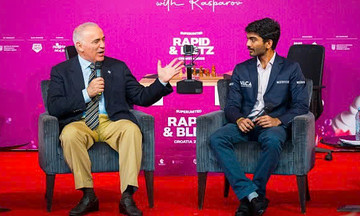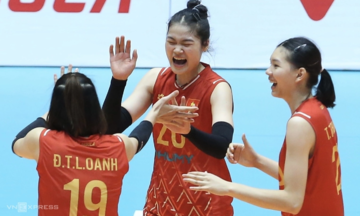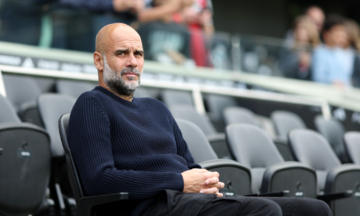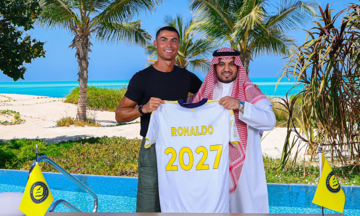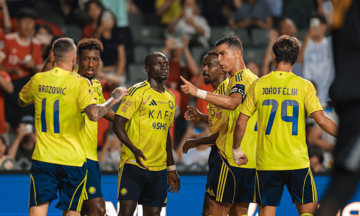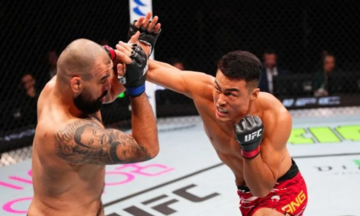 |
Vagnozzi (left), has been with Sinner since 2022, playing a major role in his ascent to world number one. Photo: IPA |
After tense weeks of work, Vagnozzi returns home to Castorano, a small village of 2,000 inhabitants in the Marche region of central Italy. There, he spends two days relaxing with his wife, doing little more than walking their small dog. This is followed by cozy dinners with friends, visits to his parents – where his mother, Nunzia, prepares his favorite pasta al ragu – and rounds of golf. While he enjoys returning home during the summer, Vagnozzi avoids the beach. "Too crowded," he says. However, there's one ritual he never misses: visiting the Maggioni Tennis Club, the small academy he founded in 2020.
Just two days after his pupil, Sinner, triumphed at Wimbledon 2025, the 42-year-old Vagnozzi was back at Maggioni. There, he diligently coached a young talent on their forehand and fine-tuned the backhand of Andrea Picchione, a 27-year-old ranked 357th in the world. "I love returning to my club, being on the court, and helping people. It's not work; it's passion," he shared in a video interview with the French newspaper L'Equipe from Cincinnati, USA.
Vagnozzi's story is that of a player once limited by his physique, unable to fully realize his tennis dreams, now living them vicariously through his coaching role.
As a child, "Vagno" dabbled in various sports, including soccer and volleyball, but only tennis truly captivated him. His father, Alfonso, who worked in the textile industry, enrolled him in the Castel di Lama club and later the Cartiera Tennis Club in Ascoli. A promising young talent, at 16, Vagnozzi moved to Caldaro, a cold mountainous region 500 km from home.
"I always wonder how a boy from Marche dared to leave his family to train in the Dolomites," mused Massimo Giusti, a close friend, comedian, and well-known Italian television host. In Trentin, coach Massimo Sartori welcomed Vagnozzi, providing him with accommodation for a few weeks. He then moved in with the uncle of Andreas Seppi, who became a close friend and doubles partner. Everyone there spoke German, creating a completely unfamiliar environment. "I was on the first floor, the Seppi family on the third," Vagnozzi recalled.
Standing at 1.63 meters and weighing 60 kg, Vagnozzi acknowledged his lack of physical advantage, but he was agile and possessed deft hands, specializing in drop shots. "One winter, I forbade Vagno from hitting drop shots to force him to improve his forehand," Sartori recounted. But Vagnozzi lacked power, and his serve was weak. "He often hit the ball with both feet off the ground to generate more force," his former coach remembered. "The later the match went, the more tired he became, losing his positioning and allowing opponents to easily overtake him."
"Without powerful weapons, Vagno had to use his head and become a crafty player," observed Alessandro Motti, a former doubles partner.
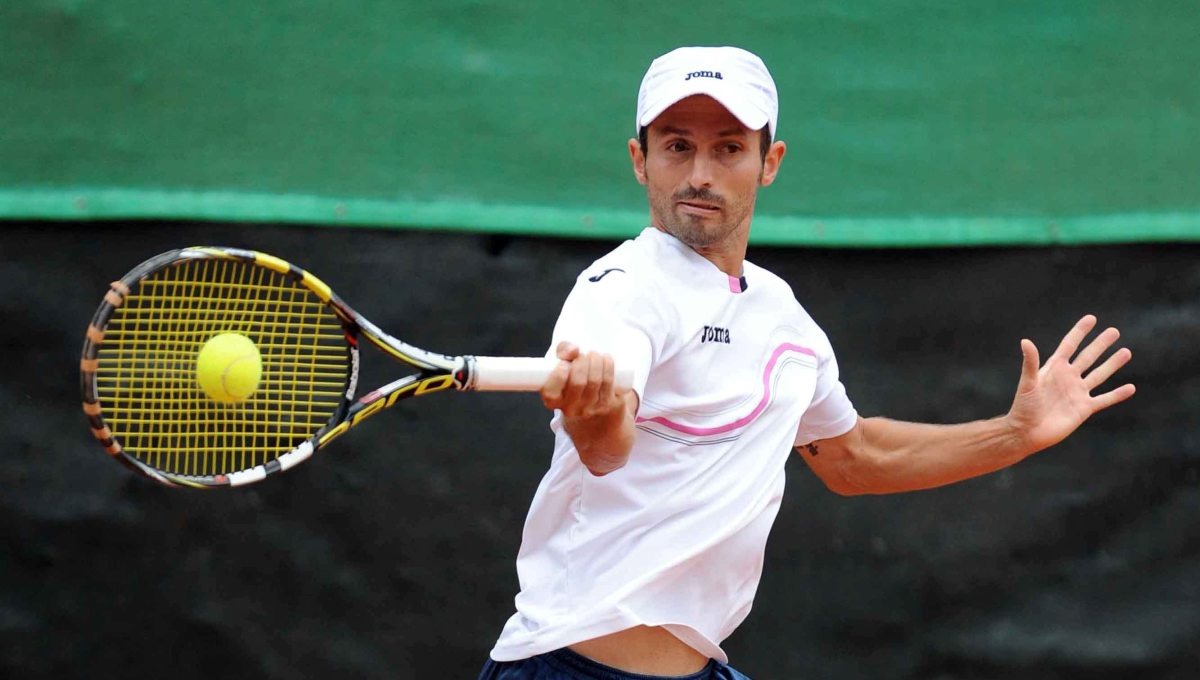 |
Vagnozzi during his playing days. Photo: Gazzetta dello Sport |
The early days of Vagnozzi's professional tennis career were challenging. "I struggled a lot. My family wasn't wealthy, and tournament prize money was meager," he reminisced. From 19 to 24, he often traveled to tournaments alone, unable to afford a coach. "I think I made every mistake a player could make," he admitted.
He also experienced an internal conflict, similar to Carlos Alcaraz today. "I always struggled between dedicating myself 100% to tennis and living a normal life like any 21 or 22-year-old. When you're young, you don't want to miss out on the best years. I was with my family, then suddenly free to do whatever I wanted. And I enjoyed that."
The peak of Vagnozzi's playing career came in 4/2011 in Barcelona. After qualifying, he defeated Fabio Fognini and Juan Monaco before narrowly losing to Juan Carlos Ferrero in three sets. His biggest regret was entering 16 Grand Slam qualifying rounds but never advancing to the main draw. Vagnozzi's highest rankings were 161st in singles and 74th in doubles – with four appearances in Major tournaments alongside Seppi.
In the summer of 2015, at 32, shortly after getting married and returning home, Vagnozzi decided to retire. "After a training session, I went home and told my wife, 'That's it.' I hadn't planned it at all," he said. But the idea of coaching had been brewing since his playing days. "My path was to become a coach, not a top-100 player."
No one was surprised by his decision. "Vagno was the player I coached who had the most intense passion for tactics and the essence of tennis. He paid close attention to opponents, always devising tactical plans to defeat them, knew his limitations, and cleverly overcame them. That spirit never left him," affirmed Sartori.
Giancarlo Petrazzuolo vividly remembers a practice session with Vagnozzi in Banja Luka, Bosnia-Herzegovina, in 2012. "I noticed his forehand was significantly faster than mine. I asked how someone with such a slender build could generate such power. Vagno explained about locking the head, hips, and left shoulder. At that moment, I realized he was born to be a coach."
In reality, Vagnozzi had been coaching even before officially assuming the role. "When I watched my friends compete, I always tried to help them, and I really enjoyed it. This definitely helped me a lot in my second career," he confessed.
Vagnozzi quickly transitioned into coaching. But in his luggage, he never forgot a soccer ball for playing football tennis and a deck of cards.
He first coached Gianluca Quinzi, a young talent who didn't reach great heights. In 2016, he worked with Marco Cecchinato, an enthusiastic Italian player, assisted by Sartori. "I was the first real player Vagno coached... Not bad for a first try!" boasted Cecchinato, who climbed from 180th to 16th in the world rankings. Their journey was highlighted by a historic victory over Novak Djokovic in the quarterfinals of the 2018 French Open.
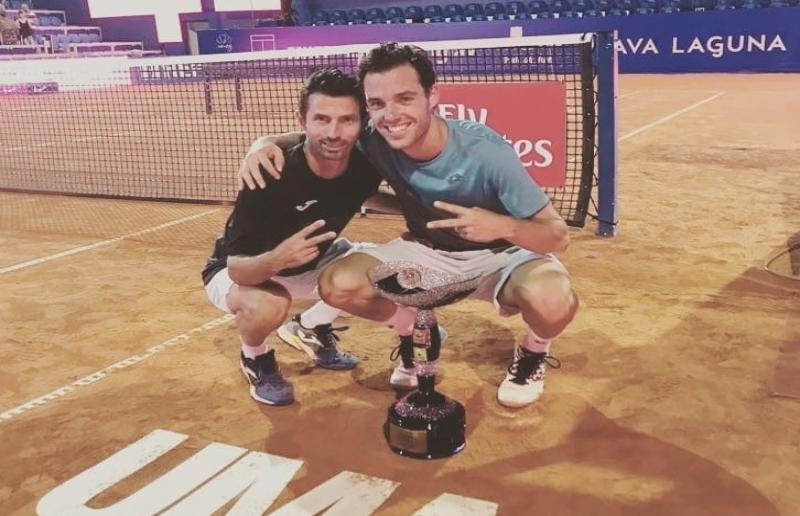 |
Cecchinato and Vagnozzi (left) celebrate one of the young Italian's titles in 2018. Photo: picenotime |
"Vagno taught me so much. His technical knowledge is amazing. He understands my game and knows how to maximize my potential," praised Cecchinato. Diego Nargiso, a former player ranked 67th in the world in 1988, commented, "Cecchinato never reached that level again, which demonstrates the value of a coach like Vagno."
Roberto Marcora, who reached a career-high ranking of 150th in 2020, was also coached by Vagnozzi. He recalled a bitter defeat in the qualifying round of the Montevideo Challenger in 11/2017: "I left the court furious; my forehand was a disaster." Marcora recounted the conversation with his coach that day: "He asked me, 'How many forehands do you think you missed?' I replied, 'I don't know... Maybe 30 or 40. Luckily, I still have my backhand.'"
Vagnozzi took Marcora back to his room, turned on the computer, and reviewed key moments of the match. "He pointed out that at crucial points, I didn't miss with my forehand but with my backhand. I felt foolish, as it was 11 p.m. in Uruguay, and we were still analyzing my mistakes after dinner," Marcora recounted.
Vagnozzi then worked with Stefano Travaglia, guiding him from 200th to 60th in the world in 2021. He then took a break, working at the academy near his home and a tennis club in Rome opened by his close friend, Giusti. During a vacation in Formentera, Spain, he posted a photo on Instagram, sitting on a balcony with a beer, writing: "Tennis addict... even on vacation!" On his tablet was the 2021 US Open quarterfinal where Alexander Zverev defeated Sinner.
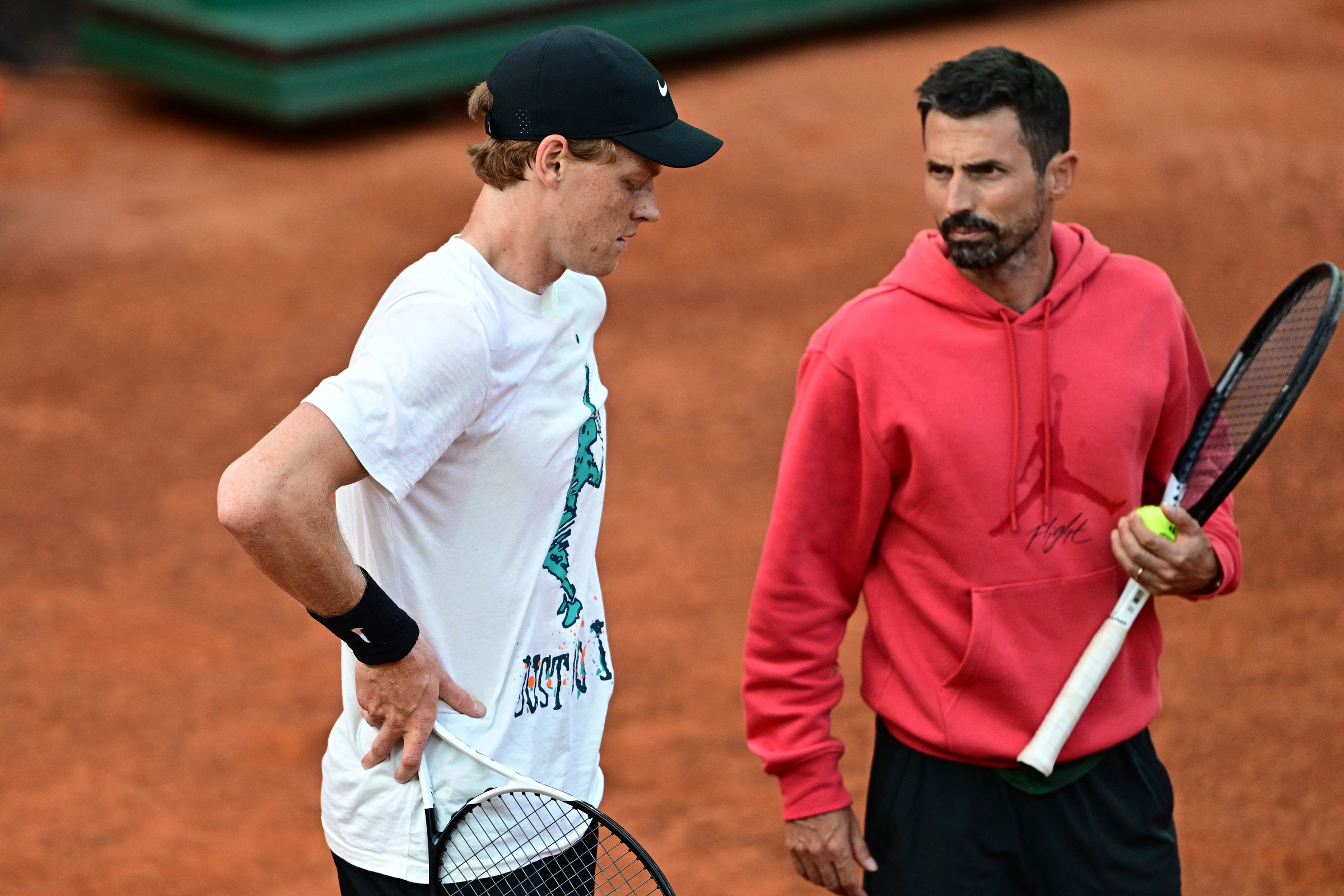 |
Jannik Sinner (left) discusses strategy with coach Simone Vagnozzi during a training session at the Foro Italico ahead of the Rome Masters on 5/5/2025. Photo: AFP |
Then, in early 2022, Vagnozzi found his perfect match. He called Giusti to inform him about a meeting with Sinner: "Max, I won't be able to come to Rome this week." Giusti recalled: "I was both sad and happy, as my club was about to lose Vagno." Alex Vittur, Sinner's manager and a close friend of Vagnozzi, connected the two.
Vagnozzi officially took charge of a top player, replacing Riccardo Piatti, who had worked with Sinner for seven years. Despite doubts about his limited coaching resume, Vagnozzi was confident in his plan. He recounted his first conversation with Sinner: "I asked him, 'What's your goal?' and he replied, 'To become number one in the world and win a Grand Slam.'"
"I remember telling Jannik, 'You're a talented player, but to achieve your goals, you have to be even better. What you're doing now isn't enough. You have to surpass Novak, Carlos, Rafa, Medvedev – those who will exploit your weaknesses. You need to maintain your identity, but you must refine your game,'" Vagnozzi recounted.
From there, they began. Darren Cahill, who had coached Lleyton Hewitt, Andre Agassi, and Simona Halep, joined the team, focusing on the mental and tactical aspects. Meanwhile, Vagnozzi assumed the role of technical and strategic coach, described by Marcora as "the one doing the heavy lifting." He gradually shaped Sinner into a complete player, almost unbeatable, an upgraded version of Djokovic.
Now, no one questions Sinner's decision three years ago. 20 singles titles, including 4 Grand Slams, 4 Masters 1000s, two Davis Cups, and the world number one ranking since 10/6/2024. Vagnozzi, as a player, dreamed of winning Wimbledon. He didn't achieve it, but Sinner fulfilled that dream for him. Together, they also weathered storms, like the positive clostebol test in 3/2024, resulting in a three-month suspension starting in 2/2025.
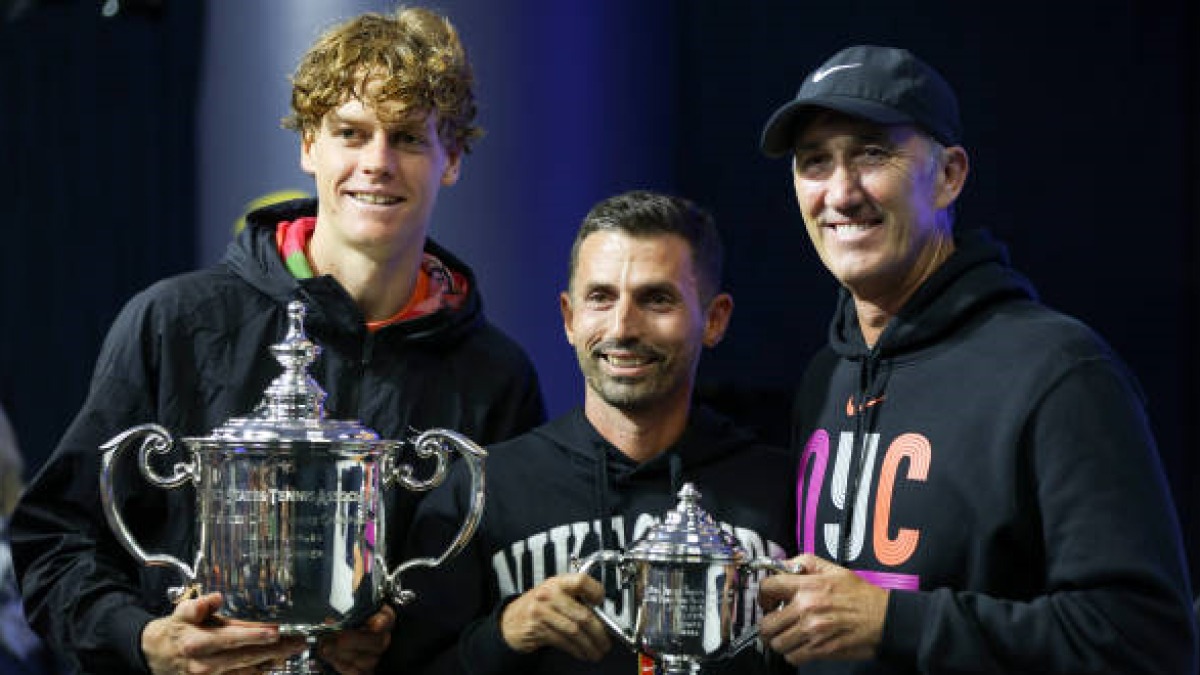 |
From left: Sinner, Vagnozzi, and Darren Cahill celebrate the Italian's US Open victory in 2024. Photo: AFP |
Their bond strengthened further as Sinner visited Vagnozzi's hometown in Marche, enjoying olive all’ascolana and grilled lamb arrosticini. "We are similar in that we are never satisfied, always wanting to improve. But our personalities are different: Jannik is from northern Italy, serious and disciplined, while I sometimes say silly things," Vagnozzi chuckled. "I can be playful and humorous. But in my work, I'm extremely serious, wanting everything to be perfect and worrying about every detail. I always plan, anticipate everything. My brain never stops working."
Success doesn't always follow a straightforward path. Vagnozzi may not have achieved his ambitions as a player, but he accomplished his later dream: becoming an outstanding coach, recognized by his peers. Fame hasn't changed Vagnozzi; friends say he's still the same, just busier.
On Vagnozzi's left bicep is a tattoo of a few lines in Hindi, inked when he was around 19 or 20. It's a Gandhi proverb that, as he explains it, means: "When you sow good seeds, the tree will grow. If sown correctly, the fruit will be sweet." Sinner is excellent, and so is Vagnozzi.
Hoang Thong (adapted from L’Equipe)




